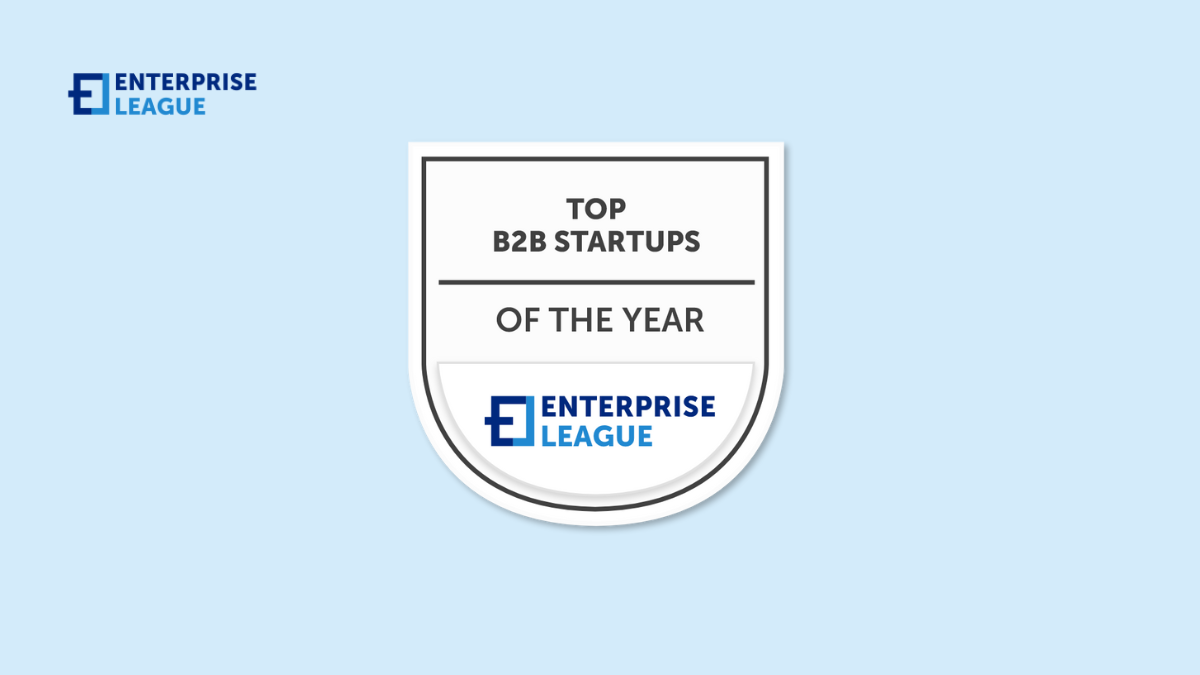The B2B startup landscape today features exciting companies spanning various sectors and specialties – from supply chain and logistics, to software and data analytics, to financial services and beyond. These B2B startups stand out for their unique value propositions, rapid growth, and potential to evolve into market leaders.
Top B2B startups
Complete list of B2B startups that are worth knowing:
Databricks
Founded in 2013, Databricks leverages open architectures and cloud infrastructure to integrate all data types. This includes structured, unstructured and streaming data. The Lakehouse platform also features collaborative notebooks for building pipelines, analytics and AI.
With a single platform spanning infrastructure, analysis and machine learning, Databricks powers complete data lifecycle management. The unified ecosystem enables faster, more accurate business decisions through robust access to integrated data.
Lemlist
Founded in 2017, Lemlist offers templates and sequencing to personalize cold email outreach. Features like send time optimization and inbox testing improve deliverability. The platform also suggests content ideas based on prospect LinkedIn profiles.
Once connected to CRMs and email, Lemlist tracks interactions within threads for insights. Sales teams gain visibility into what content and messaging works. The software handles follow-ups and scheduling automatically based on responses.
Emissary
Founded in 2018, Emissary taps into alumni networks and personal connections to facilitate warm introductions. Sales reps get calls with executives who recently left a prospect company. During these chats, reps gain invaluable context on deal strategies.
It’s a mutually beneficial matchmaking platform. Former executives become valuable advisers to sales teams targeting their past employers. They provide intel like org structures, buying processes and leveraging deals.
Moglix
Founded in 2015, Moglix provides a one-stop shop for MRO and other supplies for businesses. Buyers can browse and purchase over 500,000 SKUs at transparent prices. The catalog spans trusted global brands to reliable private labels exclusive to Moglix.
Key features include price discovery, quotation management and integrated procurement workflows. By centralizing purchasing online, Moglix unlocks substantial savings in both product costs and process expenses.
Upflow
Founded in 2020, Upflow targets the $120 trillion global B2B payments market. Their products integrate with accounting software to centralize approvals, invoices, payments and reconciliation. In one dashboard, businesses gain visibility and control over payables and receivables.
Key capabilities include predictive invoices, flexible payment options and cash flow insights. By streamlining operations, Upflow enables faster, smarter decisions on payments and vendor relations. The software remembers default settings to save time.
ELEMENT Insurance
Founded in 2019, ELEMENT streamlines the process of designing, launching and managing custom insurance programs at scale. Their API-based platform rapidly prototypes tailored products based on unique partner needs.
The ELEMENT model enables end-to-end digital distribution more flexibly than legacy carriers can match. Partners embed protection directly into customer journeys for frictionless rollout. Ongoing optimization is also baked into every offering.
Libeo
Founded in 2021, Libeo provides an intuitive dashboard to manage the entire purchase-to-pay process. Features like mobile invoice capture, automated coding and integrated payments save time over manual methods.
Libeo syncs seamlessly with popular small business accounting tools. Owners gain real-time visibility into cash flow and outlays while eliminating paperwork. The software remembers individual vendor profiles as well for faster processing.
Salesflo
Founded in 2021, Salesflo digitizes the previously manual, relationship-driven wholesale ordering process. Retail buyers can now search supplier catalogs, view quantity discounts and place pickup/delivery orders 24/7 through Salesflo.
Key capabilities include real-time inventory visibility, payment processing and order tracking. By centralizing wholesale supply channels online, Salesflo reduces friction and unlocks major time savings for retailers.
Shippeo
Founded in 2014, Shippeo built a platform that connects shippers to all their logistics providers for integrated tracking. Their system aggregates and analyzes shipment location data from carriers along with context like weather, traffic and unplanned events.
Advanced algorithms generate highly accurate predictive ETAs down to the shipment level. Customers also gain data-driven insights into carrier performance issues. The Shippeo platform integrates via API with any TMS, WMS or ERP system.
TransferMate Global Payments
Founded in 2010, TransferMate offers an alternative to slow, expensive bank payments through their regulated global network. Businesses enjoy much faster transfer turnaround times at lower fees compared to traditional wire transfers.
Key features include locked-in exchange rates, virtual IBAN accounts in over 20 currencies, and API integration. TransferMate handles the foreign exchange, last mile settlement, and compliance vetting behind the scenes.
Nulogy
Founded in 2002, Nulogy builds custom solutions for the complex, fast-turning world of co-packing consumer goods. Lead times are ultra-short with volatile demand swings. Nulogy’s technology orchestrates the real-time supply ecosystem to enable rapid scalability.
Key features include connected factory visibility, demand planning and production scheduling. By integrating data and systems end-to-end, Nulogy multiplies agility and minimize waste for contract packagers. Consumer brands in turn gain reliability.
Chiper
Founded in 2021, Chiper equips traditional bodegas with websites, apps and logistics to unlock sales beyond foot traffic. Owners manage online product catalogs and process mobile orders on Chiper. Last-mile delivery is facilitated through partnerships.
By providing a digital stack, Chiper brings neighborhood shops into the e-commerce economy. Small businesses gain new revenue streams while serving communities with convenience. Additional services like analytics and advertising help store owners optimize and compete.
Frubana
Founded in 2020, Frubana offers a streamlined way for small food businesses to order everything from fresh produce to napkins. Their site enables lower pricing through transparent listings and aggregated demand. Frubana handles logistics like inventory sourcing, storage and last mile delivery.
By centralizing fragmented distribution channels online, Frubana unlocks major time and budget savings for independent food operations. Owners gain purchasing power without large membership fees. Analytics also provide data to minimize waste.
InstaFreight
Founded in 2016, InstaFreight built an automated brokerage connecting cargo demand with trusted carrier capacity. Customers access real-time transport routes and instant pricing to compare optimal options by time or cost. Loads auto-match to vetted trucks.
Key features offer tracking visibility, digital paperwork and customized analytics. By accelerating load matching and documents handling online, InstaFreight unlocks major time savings over manual freight processes.
Paystone
Founded in 2019, Paystone equips field sales and service teams with an all-in-one mobile app. Employees access CRM profiles and present customized catalogs for improved client meetings. Payments can also be securely collected on the spot.
By unifying tools and data, Paystone multiplies salesforce productivity and business insights. Previously disjointed systems now provide comprehensive customer lifecycle visibility. Key features like offline mode keep field ops running smoothly.
Floranow
Founded in 2019, Floranow leverages technology to open new models for sourcing fresh flora. Growers list available inventory while buyers order through regional storefronts. Floranow handles logistics like cold storage and transport.
Key focuses include longer shelf life through optimized handling and transparency tools to reduce waste. By smoothing supply and demand globally, Floranow unlocks growth opportunities for nurseries and buyers alike.
HUBUC
Founded in 2021, HUBUC speeds up the process of building fintech apps or adding finance tools to existing offerings. Core capabilities handle services like account onboarding, transaction processing and programmable debit cards.
By abstracting the complexity behind an easy API, HUBUC allows product builders to embed banking with minimal legal and tech lift. License sponsorship, compliance infrastructure, card scheming and more are handled out of the box.
Modalku
Founded in 2016, Modalku leverages technology to broaden funding channels for micro, small and medium enterprises in Indonesia. Applicants complete digital profiles for assessment including growth metrics. Modalku’s model allows risk pricing suited to each business.
By expanding capital access online, Modalku empowers job-creating yet underbanked ventures to sustain and expand. Loans support pivotal growth phases like inventory purchases. Investors enjoy portfolio diversification with aggregated lower-risk deal flow.
Convictional
Founded in 2018, Convictional streamlines onboarding third-party sellers into branded marketplaces. Suppliers manage merchandise, inventory and fulfillment via Convictional tools integrated with host sites. This enables turnkey merchandising without heavy IT lifts.
For hosts, the platform centralizes suppliers and listings for a unified brand experience. Automated order routing also eliminates manual purchase order hassles. Convictional sychronizes all systems and data seamlessly via API.
Routable
Founded in 2019, Routable built an integrated payments network for prompt visibility and settlement between companies. Customers gain a unified view of cash flow across outlays, invoices and merchant services.
Key features include embedded invoicing, international payment acceptance and reconciliation. By centralizing payments management on easy-to-use dashboards, Routable delivers significant time savings over legacy workflows.
Conclusion
The world of business-to-business (B2B) startups is thriving with innovative companies looking to streamline operations, increase efficiency, and disrupt established industries. By introducing breakthrough innovations aimed squarely at improving how businesses operate and relate to their partners and clients, these B2B startups represent the future of the industry.
Discover more creative startups that might interest you:
- Innovative project management startups boosting efficiency.
- World’s leading PaaS startups changing the game.
- Revolutionary neuroscience startups enhancing the industry with amazing innovations.
- Revolutionary biotech startups helping the world with amazing innovations.
Related Articles
10 business tips for beginners to help you build a healthy brand
Starting a business can be quite the challenge especially if you’re all new to entrepreneurship. These business tips for beginners will help you set off on the right foot.
SEO writing: Five foolproof tips to secure you the first page
When it comes to SEO writing it’s more guessing and less evidence about what works and what doesn’t. Luckily, we know what can really help you reach the first page.
How to onboard a new employee: Tips for quick integration
Your guide to smoother employee onboarding where you will find practical strategies that help new hires feel welcome and become productive team members faster.
10 business tips for beginners to help you build a healthy brand
Starting a business can be quite the challenge especially if you’re all new to entrepreneurship. These business tips for beginners will help you set off on the right foot.
SEO writing: Five foolproof tips to secure you the first page
When it comes to SEO writing it’s more guessing and less evidence about what works and what doesn’t. Luckily, we know what can really help you reach the first page.








